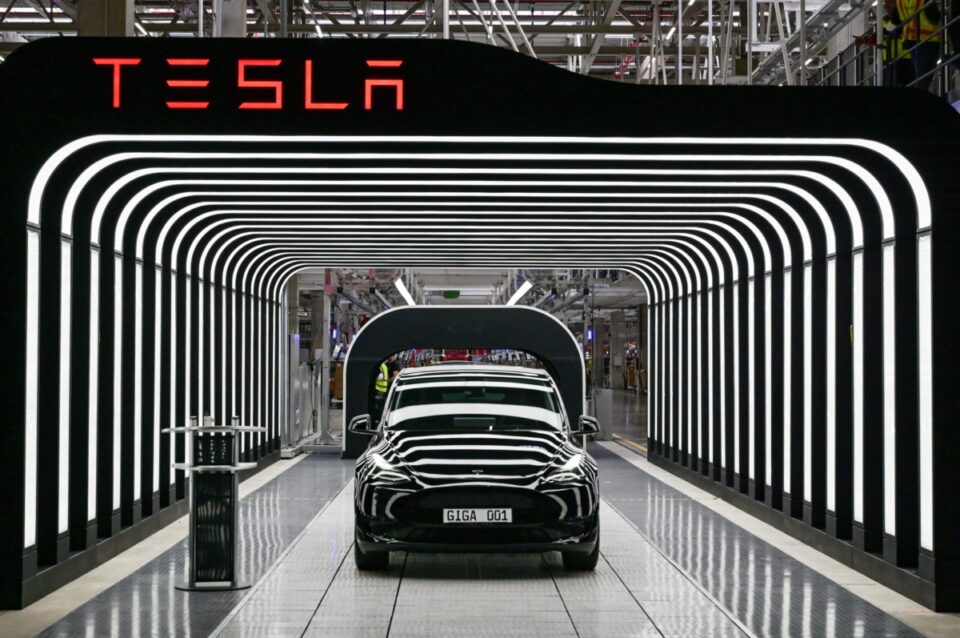WASHINGTON, April 6 — Tesla has canceled the long-promised inexpensive car that investors have been counting on to drive its growth into a mass-market automaker, according to three sources familiar with the matter and company messages seen by Reuters.
The automaker will continue developing self-driving robotaxis on the same small-vehicle platform, the sources said.
The decision represents an abandonment of a longstanding goal that Tesla chief Elon Musk has often characterised as its primary mission — affordable electric cars for the masses.
His first “master plan” for the company in 2006 called for manufacturing luxury models first, then using the profits to finance a “low cost family car.”
Musk has since repeatedly promised such a vehicle to investors and consumers. As recently as January, Musk told investors that Tesla planned to start production of the affordable model at its Texas factory in the second half of 2025, following an exclusive Reuters report detailing those plans.
Tesla’s cheapest current model, the Model 3 sedan, retails for about $39,000 in the United States. The now-defunct entry-level vehicle, sometimes described as the Model 2, was expected to start at about $25,000.
Tesla did not respond to requests for comment. After the story was published, Musk posted on his social media site X that “Reuters is lying (again).” He did not identify any specific inaccuracies.
Tesla shares tumbled more than 6% following Reuters’ report but recovered some of the loss after Musk’s post. The stock was down 3.6% at Friday’s market close.
Shortly afterward, Musk posted on X: “Tesla Robotaxi unveil on 8/8,” sending shares back up in after-hours trading.
The stark reversal comes as Tesla faces fierce competition globally from Chinese electric-vehicle makers flooding the market with cars priced as low as $10,000. The plan for driverless robotaxis, which could take longer to deliver, presents a stiffer engineering challenge and more regulatory risk.
Two sources said they learned of Tesla’s decision to scrap the Model 2 in a meeting attended by scores of employees, with one of them saying the gathering happened in late February.
“Elon’s directive is to go all in on robotaxi,” that person said.
The third source confirmed the cancellation and said new plans call for robotaxis to be produced, but in much lower volumes than had been projected for the Model 2.
Several company messages reviewed by Reuters about the decision included one on March 1 from an unnamed program manager for the affordable car discussing the project’s demise with engineering staff and advising them to hold off on telling suppliers “about programme cancellation.”
A fourth person with knowledge of Tesla’s plans expressed optimism about the decision to pivot away from the cheap-car strategy in favour of robotaxis, a segment Musk has envisioned as the future of mobility. The source cautioned that Tesla’s product plans could change again based on economic conditions.
Squeezing profits from entry-level vehicles is a challenge for any automaker. But Tesla’s delay in pursuing the car Musk once called his dream made it much tougher because it now faces far more competition in that price range.
While Tesla spent years developing its highly experimental Cybertruck, a pricey electric pickup, Chinese automakers have raced ahead on affordable EVs, grabbing market share, gaining economies of scale and offering consumers bargain prices that Western automakers are struggling to match.
As Chinese EVs surged to challenge Tesla’s dominance, Musk was tending to his sprawling empire, which includes rocket-maker SpaceX, brain-chip developer Neuralink, and social media giant X, which Musk acquired in 2022.
Formerly called Twitter, the platform has foundered under Musk’s volatile management, shedding most of its value as the company has lost revenue and advertisers.
Plans for the affordable Tesla have been seen as key to delivering on Musk’s stratospheric ambitions for sales growth. Musk said in 2020 that Tesla aspired by 2030 to sell 20 million vehicles — twice as many as the world’s largest automaker, Toyota, sells today. With the death of the Model 2, it’s unclear how he’ll get there.
Expectations for a $25,000 vehicle have underpinned Wall Street analysts’ more modest, but still ambitious, forecasts for Tesla sales. Those forecasts, according to a Tesla investor-relations document, call for vehicle sales rising to 4.2 million by 2028 from 1.8 million last year.
Musk has wavered on the project before. In a biography of the entrepreneur released last year, author Walter Issacson reported that Musk in 2022 “put a hold on” the entry-level EV plans, reasoning that a Tesla robotaxi would make the car irrelevant. Musk’s advisors urged him to stay the course, the book said.
— Reuters





